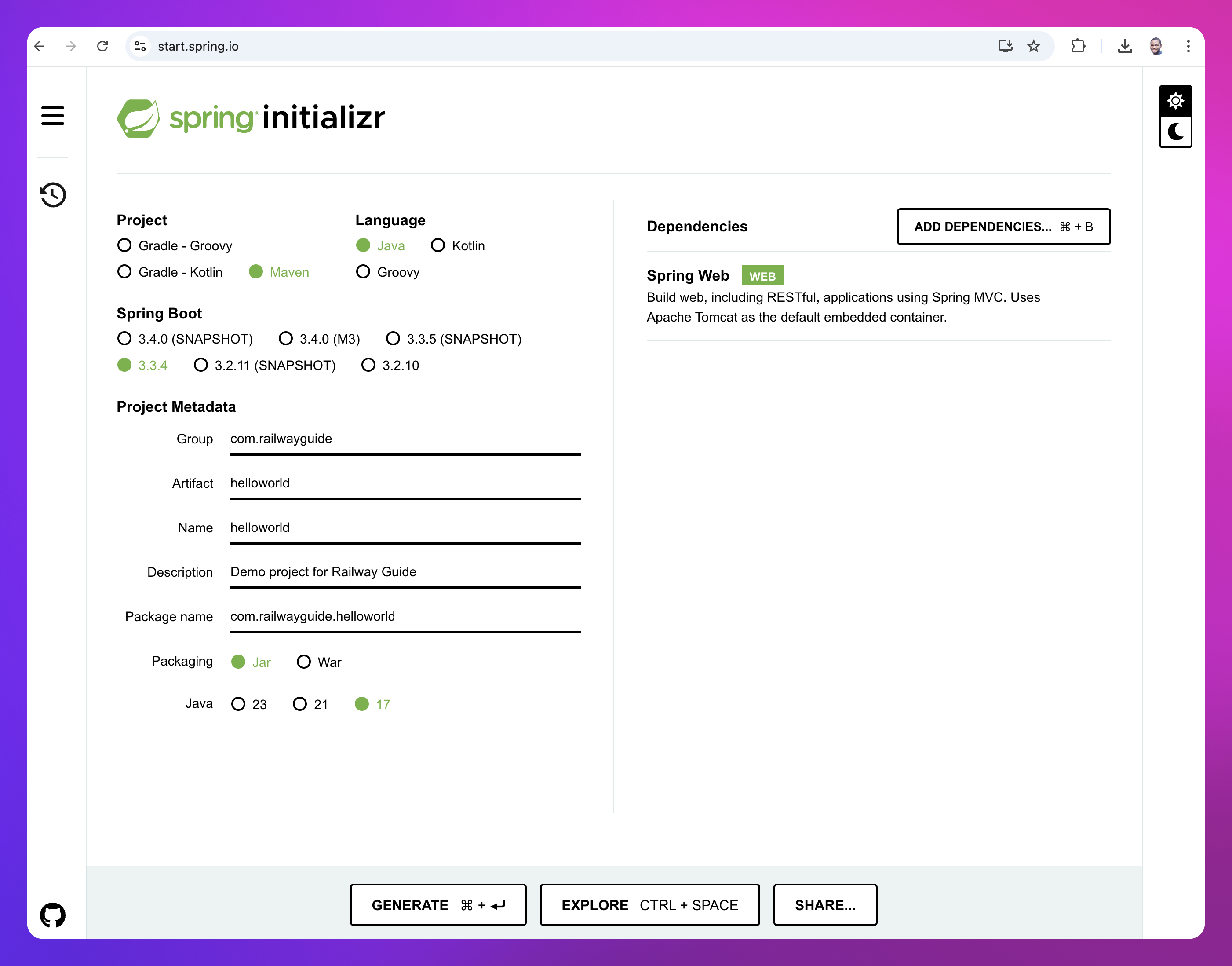Deploy a Spring Boot App
Spring Boot is a Java framework designed to simplify the creation of stand-alone, production-ready Spring applications that are easy to run right out of the box.
This guide covers how to deploy a Spring Boot app to Railway in four ways:
Now, let's create a Spring Boot app!
Create a Spring Boot app
Note: If you already have a Spring Boot app locally or on GitHub, you can skip this step and go straight to the Deploy Spring Boot App to Railway.
To create a new Spring Boot app, ensure that you have JDK installed on your machine.
Go to start.spring.io to initialize a new Spring Boot app. Select the options below to customize and generate your starter app.
- Project: Maven
- Language: Java
- Spring Boot: 3.3.4
- Project Metadata:
- Group: com.railwayguide
- Artifact: helloworld
- Name: helloworld
- Description: Demo project for Railway Guide
- Package name: com.railwayguide.helloworld
- Packaging: jar
- Java: 17
- Dependencies:
- Click the Add Dependencies button and search for Spring Web. Select it.

Now, click on the Generate button, download the zipped file and unpack it into a folder on your machine.
Modify the application file
Next, open the app in your IDE and navigate to the src/main/java/com/railwayguide/helloworld/HelloWorldApplication.java file.
Replace the content with the code below:
A hello() method was added that returns the response: Hello world from Java Spring Boot!.
The @RestController annotation designates this class as a web controller, while @GetMapping("/") maps the hello() method to handle requests sent to the root URL, /.
Run the Spring Boot app locally
Next, cd into the helloworld directory via the terminal and run the following Maven command:
Note: This is a Maven wrapper for Linux and macOS, which uses a bundled version of Maven from .mvn/wrapper/maven-wrapper.jar instead of relying on the system-installed version.
Open your browser and go to http://localhost:8080 to see your app.
Deploy the Spring Boot app to Railway
Railway offers multiple ways to deploy your Spring Boot app, depending on your setup and preference.
One-click deploy from a template
If you’re looking for the fastest way to get started, the one-click deploy option is ideal.
Click the button below to begin:
It is highly recommended that you eject from the template after deployment to create a copy of the repo on your GitHub account.
Note: You can also choose from a variety of Spring Boot app templates created by the community.
Deploy from the CLI
- Install the Railway CLI:
- Install the CLI and authenticate it using your Railway account.
- Initialize a Railway Project:
- Run the command below in your Spring Boot app directory.
- Follow the prompts to name your project.
- After the project is created, click the provided link to view it in your browser.
- Run the command below in your Spring Boot app directory.
- Deploy the Application:
- Use the command below to deploy your app:
- This command will scan, compress and upload your app's files to Railway. You’ll see real-time deployment logs in your terminal.
- Once the deployment completes, go to View logs to check if the service is running successfully.
- Use the command below to deploy your app:
- Set Up a Public URL:
- Navigate to the Networking section under the Settings tab of your new service.
- Click Generate Domain to create a public URL for your app.

Deploy from a GitHub repo
To deploy a Spring Boot app to Railway directly from GitHub, follow the steps below:
-
Create a New Project on Railway:
- Go to Railway to create a new project.
-
Deploy from GitHub:
- Select Deploy from GitHub repo and choose your repository.
- If your Railway account isn’t linked to GitHub yet, you’ll be prompted to do so.
- Select Deploy from GitHub repo and choose your repository.
-
Deploy the App:
- Click Deploy to start the deployment process.
- Once the deployed, a Railway service will be created for your app, but it won’t be publicly accessible by default.
-
Verify the Deployment:
- Once the deployment completes, go to View logs to check if the server is running successfully.
Note: During the deployment process, Railway will automatically detect that it’s a Java app.
-
Set Up a Public URL:
- Navigate to the Networking section under the Settings tab of your new service.
- Click Generate Domain to create a public URL for your app.
Use a Dockerfile
-
Create a
Dockerfilein thehelloworldor Spring Boot app's root directory. -
Add the content below to the
Dockerfile: -
Either deploy via the CLI or from GitHub.
Railway automatically detects the Dockerfile, and uses it to build and deploy the app.
Note: Railway supports also deployment from public and private Docker images.
This guide covers the main deployment options on Railway. Choose the approach that suits your setup, and start deploying your Spring Boot apps seamlessly!
Next steps
Explore these resources to learn how you can maximize your experience with Railway: